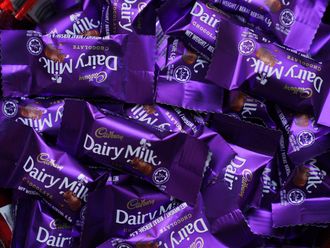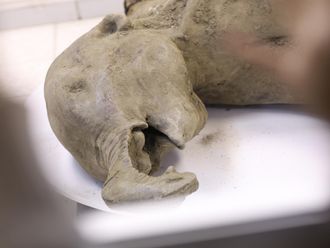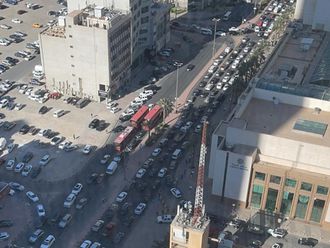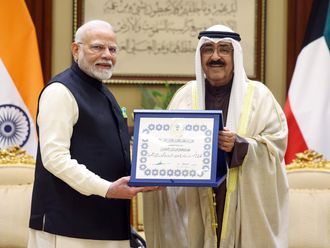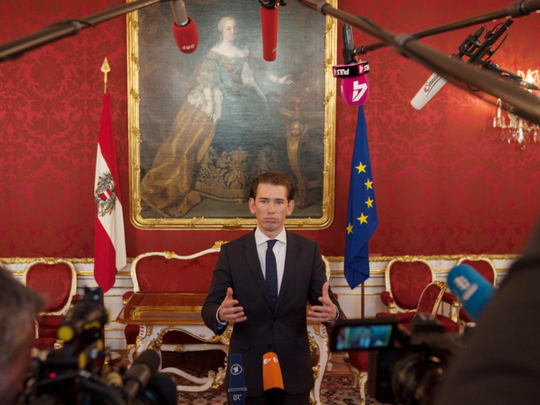
BERLIN
A little over a century ago, the ancestors of modern Austrians were at the vanguard of religious liberty in Europe, giving their small Muslim community the same rights as Christians or Jews.
Today, the much larger and rapidly growing Muslim population of Austria sees their country again setting the tone in Europe - but this time in a far more ominous direction.
In Sunday’s election, well over half the country’s voters chose parties that defined themselves by their hard-line stances on immigration, integration and multiculturalism.
The third-place finisher, the Freedom Party, campaigned on the proposition that Islam is incompatible with Austrian values and an existential threat to Europe.
The leader of the vote-topping People’s Party and Austria’s likely next chancellor, 31-year-old Sebastian Kurz, doesn’t go that far. But he’s mimicked much of the Freedom Party’s rhetoric, lashing out at Muslim kindergartens, calling for rescued migrants to be sent back to Africa and promising sharply reduced benefits for newcomers.
Fearful outcome
Together, the two parties are expected to form a coalition government that leaders of the Austrian Muslim community see as a nightmare come true.
“This election result is something we feared,” said Ramazan Demir, a Vienna-based imam and a leader of the Islamic Religious Community in Austria, an umbrella group. “During the campaign we saw how populists created panic. Austrians voted for them for that reason.”
The Austrian results reflected anti-immigrant and anti-Muslim sentiment that has been rising across Europe in recent years. But it has been especially pronounced in Austria, a country that hundreds of thousands of asylum seekers transited at the height of the European refugee crisis. Tens of thousands - many of them Muslims fleeing war in Syria, Iraq and Afghanistan - settled in the central European nation.
The newcomers added to a fast-growing Muslim community that represented just 4 percent of Austria’s population as of 2001, but has now expanded to 8 percent - or 700,000 people.
Austria was long known for its relative openness to Muslims - an outgrowth, analysts say, of a 1912 law that gave Islam official status in the Austro-Hungarian Empire and that remains on the books today, long after the empire’s collapse.
In the 1960s and 1970s, guest workers were recruited to Austria from Turkey and the Balkans. The country also welcomed significant numbers of Balkan refugees in the 1990s.
But attitudes have hardened in recent years, with widespread perceptions that newcomers haven’t adequately integrated. Terrorist attacks in Europe - and the departure of some 300 Austrian Muslims to Syria and Iraq to fight alongside the Islamic State - have heightened concerns. Politicians have picked up on the fears, and exacerbated them.
“They did their politics on the backs of Muslims,” said Demir, who is Turkish-born. “There’s never been this much Islamophobia in Austria.”
Peter Hajek, an expert on Austrian public opinion, said that after initially welcoming refugees in 2015, voters grew jaded and came to see the newcomers less as legitimate asylum seekers than as economic migrants. They also began to regard Muslims in general as suspect.
“They do not really differentiate between Muslims and Islamic extremists,” he said. “Nearly every Muslim seems to be dangerous.”
Capitalising on emotions
Kurz, more than any other mainstream politician, managed to capitalise on those sentiments.
On the campaign trail, he boasted that as foreign minister he had stopped the flow of asylum seekers along the Balkans route by closing Austrian borders. He has promised to force Europe to do the same with the central Mediterranean route, the main path by which migrants reach the continent today.
Domestically, Kurz has championed changes to the country’s laws for Muslims, including a prohibition on foreign donations for Islamic institutions and a ban on women wearing full-face veils.
He also caused a storm of controversy by commissioning a study on Islamic kindergartens, which have equal weight under Austrian law with other religious-based schools. The study found that the schools contribute to “a parallel society,” and Kurz frequently cited the findings on the campaign trail.
But the study’s methodology was widely questioned by academics, and Austrian media reported that Kurz’s ministry had changed the findings to make them more politically advantageous.
Kurz has consistently denied that charge, and his aides bristle at the notion that he’s simply copied the language and policies of the far-right. But they don’t deny that he’s responding to a genuine discomfort in Austrian society with multiculturalism.
Stoking fears
“Most European populations don’t want to become half-Afghan or half-Syrian or half-African,” said a Kurz adviser, who spoke on the condition of anonymity because he was not authorised to speak for the record. “And you have to accept it. If you don’t, we’ll go to the extreme far right.”
But that’s where some fear the country may be headed - and the fears are hardly limited to Muslims. After the vote, the European Jewish Congress called on Kurz not to pick the Freedom Party, which was founded by a former SS officer, as his coalition partner.
“Europe in general and Austria in particular should know all too well where acceptance of populist and pernicious ideologies leads,” the group said.
But the overall reaction from European leaders was muted - a stark contrast to 2000, when inclusion of the Freedom Party in an Austrian government triggered sanctions from EU members.
Muslim leaders in Austria, too, have been restrained in their public responses. There have been no major protests so far.
—Washington Post


